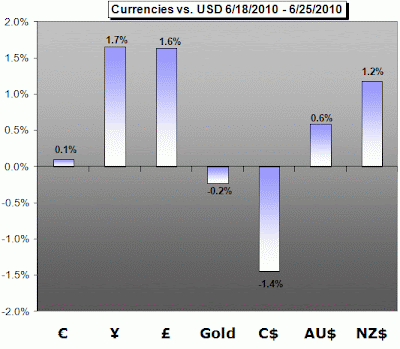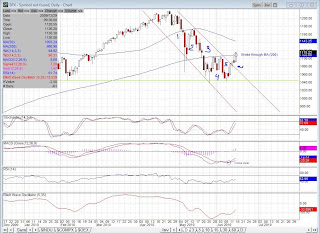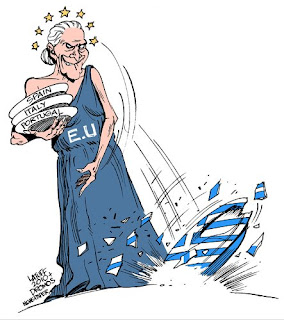
Technical Notes:
Daily Chart
- Gap down
- Extremely long bearish candle (close to a full out marubozu)
- Convergence of ST 50 SMA under LT 200 SMA
- RSI and MACD confirmation of downward momentum

Technical Notes:
- RSI and MACD indicate much lower levels - continued downward pressure and moment
- inter-temporal resistence confirmation the daily SMA crossover coincides with weekly 50 SMA resistence
SUMMARY:
I can be nothing but bearish. Amazing! my price pattern analysis was spot on with the wrong time frames! Markets are moving so rapidly with high amounts of volatility. Taking an except from my EARLIER POST from June 03, 2010 on the SPX:
"Overall Summary:
Given the amount of turmoil in the economy and markets around the world I am leaning towards the Bearish Picture more.
Bull to 1150 (By mid July)
Bear to 1060 (By end of August)
Bear if Support breaks below the 1060 level to 1000"
As you can see I stated in my follow up post in response to my SPX June 03 post, my 1150 call was skewed and wrong because I did not take into account downward pressure would make lower resistance levels from SMA's. I however got the right price pattern to 1060 and if you read on my June 03 post, I was biased towards the bearish side, as in I said it will be more likely to see 1000 before 1200. So far With the break in a possible neckline of the head and shoulder pattern, I've been dead on. Im confident we will see low 1000 levels into July.
The only thing I got wrong was that this is happening a month early.
I will maintain my bearish stance until the respective levels are reached.
---
Alexander Lê
Managing Partner
Analyze Capital LLC
email: le.alex48@gmail.com




































